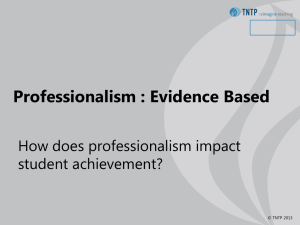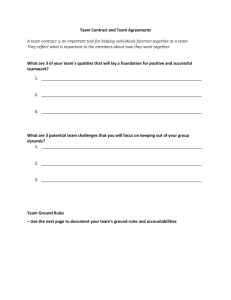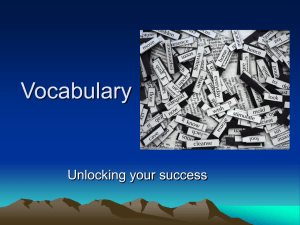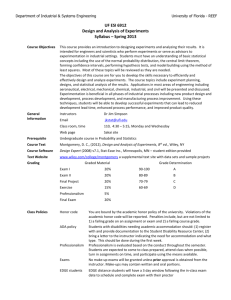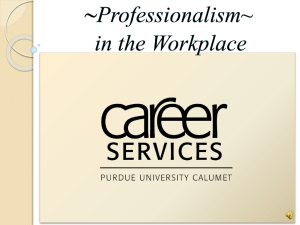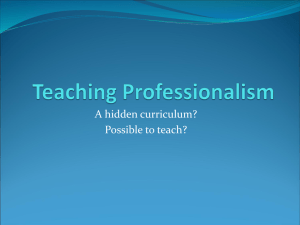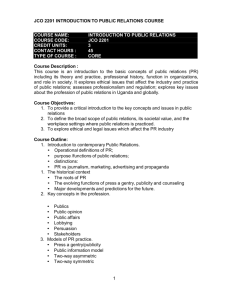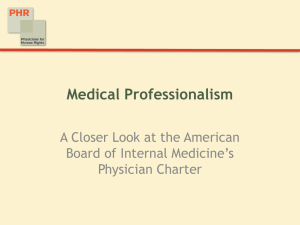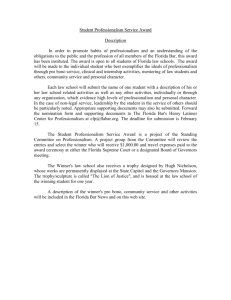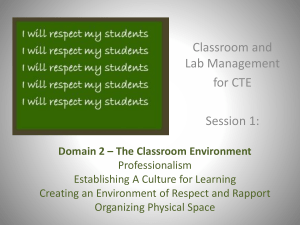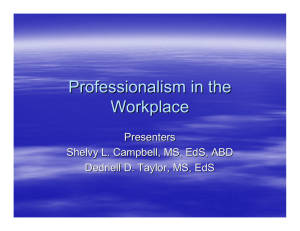Learning More by Learning to be Professional
advertisement
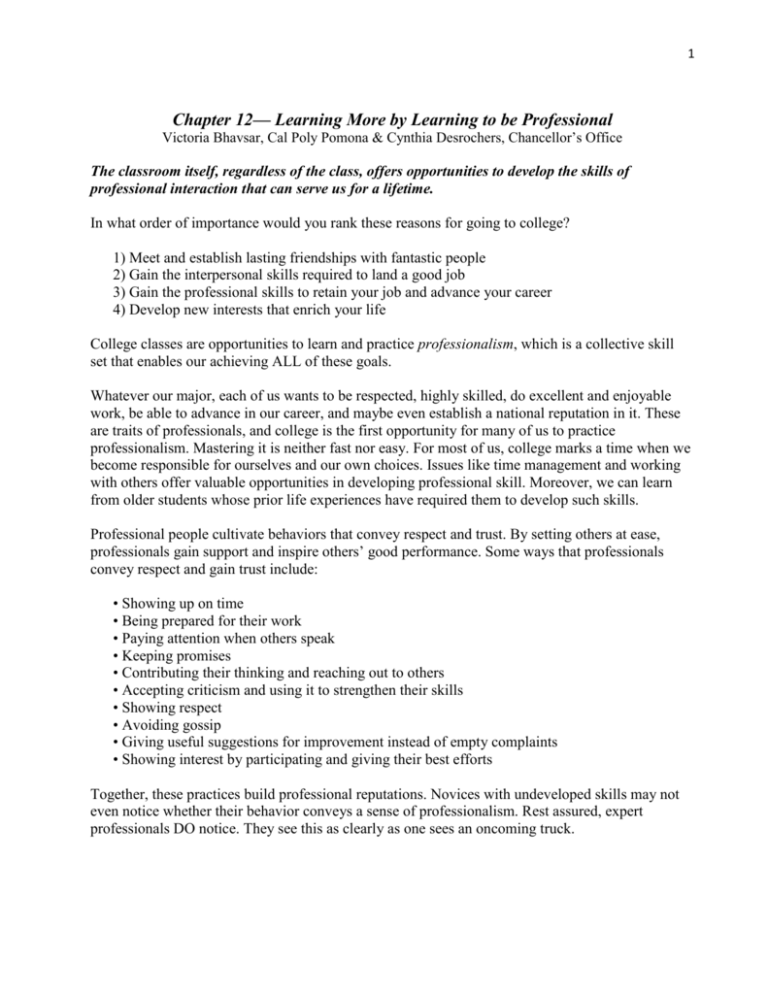
1 Chapter 12— Learning More by Learning to be Professional Victoria Bhavsar, Cal Poly Pomona & Cynthia Desrochers, Chancellor’s Office The classroom itself, regardless of the class, offers opportunities to develop the skills of professional interaction that can serve us for a lifetime. In what order of importance would you rank these reasons for going to college? 1) Meet and establish lasting friendships with fantastic people 2) Gain the interpersonal skills required to land a good job 3) Gain the professional skills to retain your job and advance your career 4) Develop new interests that enrich your life College classes are opportunities to learn and practice professionalism, which is a collective skill set that enables our achieving ALL of these goals. Whatever our major, each of us wants to be respected, highly skilled, do excellent and enjoyable work, be able to advance in our career, and maybe even establish a national reputation in it. These are traits of professionals, and college is the first opportunity for many of us to practice professionalism. Mastering it is neither fast nor easy. For most of us, college marks a time when we become responsible for ourselves and our own choices. Issues like time management and working with others offer valuable opportunities in developing professional skill. Moreover, we can learn from older students whose prior life experiences have required them to develop such skills. Professional people cultivate behaviors that convey respect and trust. By setting others at ease, professionals gain support and inspire others’ good performance. Some ways that professionals convey respect and gain trust include: • Showing up on time • Being prepared for their work • Paying attention when others speak • Keeping promises • Contributing their thinking and reaching out to others • Accepting criticism and using it to strengthen their skills • Showing respect • Avoiding gossip • Giving useful suggestions for improvement instead of empty complaints • Showing interest by participating and giving their best efforts Together, these practices build professional reputations. Novices with undeveloped skills may not even notice whether their behavior conveys a sense of professionalism. Rest assured, expert professionals DO notice. They see this as clearly as one sees an oncoming truck. 2 Moreover, when we become accustomed to seeing the effects of our professionalism, we might notice that our actions inspire professors to assist us. In time, we may ask to join their research projects or for letters of recommendation for our scholarships, internships, and jobs. Skills that build professionalism overlap with those that build friendships and healthy relationships. Practicing professionalism is also a path to building leadership skills. Success often involves knowing when things annoy others so that we can learn to avoid doing them. In research based on college students’ own comments about annoyances, students commented that other students’ noisy classroom behaviors made it hard to concentrate and learn. They noted other students’ side conversations, playing with cell phones, iPODS, and laptops, and constant entering and leaving the classroom were especially distracting. Whatever our major, each of us wants to be respected, highly skilled, do excellent and enjoyable work, be able to advance in our career, and maybe even establish a national reputation in it. These are traits of professionals. We can trace the reasons for our practicing classroom professionalism back to Chapter 1 on how the brain works. We want to build neural networks that prepare us to act appropriately when needed. We cannot create the needed networks by simply deciding that we will suddenly behave differently in a high-stakes situation. To build these networks, we actually need to internalize the learning provided by building the neural networks that are produced when we come to class on time, prepared, and with our cell phones turned off; we need to practice being fully focused and engaged in learning. When in class or small-group discussions, making eye contact, listening to what others are saying and acknowledging them, all build valuable professional skills. Cal Poly Pomona students study by the fountain. [Photo used with permission of Tom Zasadzinski, copyright 2000 3 Group work or team projects offer additional opportunities to build skills in dealing with situations where others are not acting professional. For example, suppose a group member is not contributing his or her part, is being so outspoken that no one else can talk, or is simply not showing up? Think: "How would I need to deal with this in a high-stakes situation at work?" Any response offers a learning opportunity depending on what we are willing to learn from our actions. Do we create a strategy with the other group members to address the problem? Do we ignore the problem in order to avoid unpleasant decisions? Do we drop the difficult group member from the project? Is complaining among ourselves or to the professor evidence of our acting professionally? If the professor says, “You own this problem, and you must handle it,” how will we react? Will we view this as an excellent opportunity to develop our professionalism? Reflective Exercises 1. Choose a class period or group meeting that you will attend. After the class or meeting, take a few minutes to recall and think about how you acted: Were you professional? Unprofessional? Some of both? How do you think you came across to others? Are there changes you will make next time? 2. Think of three specific actions you can take to increase your professionalism in classes or another academic setting. These can be simple, such as (1) turning off your cell phone before entering the classroom or (2) leaving home five minutes earlier in order to arrive at class on time. Whichever actions you select, set a date to begin practicing these actions and thinking about your professionalism. References Desrochers, C.G. (2010). Student behaviors that distract other students and potentially hurt their ability to learn in class. Unpublished study conducted at CSU Dominguez Hills. Rowland, M.L., & Srisukho, K. (2009). Dental students’ and faculty members’ perceptions of incivility in the classroom. J Dent Educ. 73(1): 119-126. Wheatley, M.J. (2006). Leadership and the New Science: Discovering Order in a Chaotic World Third Edition: San Francisco: Burrett Koehler.
